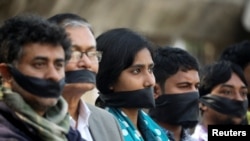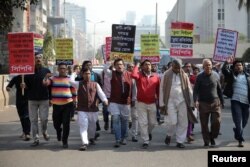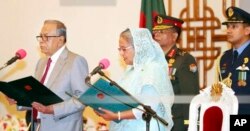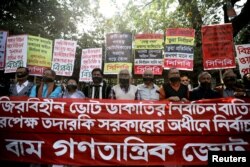In the wake of Bangladesh's recent general election, opposition coalition and pro-democracy activists expressed disappointment with alleged episodes of vote manipulation going largely unreported in the local media. But several journalists argue that fear of government reprisals led many media outlets to avoid publishing stories about the alleged wrongdoing.
"The level of vote robbery in the December 30 general election was unprecedented in world history. Ahead of conducting the massively rigged election, the government introduced some black laws, like the Digital Security Act, to shackle the media," BNP senior joint secretary Ruhul Kabir Rizvi Ahmed told VOA.
"In different ways the government issued threats to the domestic media outlets to keep them away from reporting freely and not to let the outside world know of the massive vote manipulation," he said.
A Dhaka-based national TV channel news producer said many media outlets could not exercise their freedom during the election.
"Ahead of the general election, the Election Commission issued new guidelines strictly limiting the coverage-related activities of the journalists during the polling. In a first ever such move, it banned photography, videography or live telecast of the polling-related activities inside voting centers," said a Dhaka-based national TV channel news producer who requested anonymity for fear of reprisal by the government.
'Chilling message'
"Journalists got a chilling message that if they flouted the guidelines they would face serious retribution from the government. In such a terrifying situation, the rigging-related activities went largely unreported."
Other journalists who told VOA similar stories did not want to be quoted, saying they feared reprisals from the government.
"They are facing severe pressure on many fronts, including arbitrary arrests and beating by police, forced disappearances and tough criminal defamation and online security laws that have put many in jail," said Steven Butler, Asia Program coordinator of the New York-based Committee to Protect Journalists (CPJ).
"They also endure repeated intimidating advisory phone calls from police, army intelligence and the government. The net result is a siege mentality. So, it's not surprising they are afraid to report on election irregularities they have witnessed," Butler added.
Vote fraud allegations
After the schedule of the general election was announced by Bangladesh's election commission in early December, the government reiterated that the election would be free, fair and all-inclusive.
But hours before the polling began on Dec. 30, the opposition alliance alleged that activists of the ruling Awami League (AL) were illegally stuffing ballot boxes at many voting centers across the country in the presence of election and security officials.
On the day of the polling, the alliance also alleged that tens of thousands of its polling agents, intimidated by AL supporters, had been driven away from the voting centers across the country.
After the election commission announced that the Awami League and its allies had overwhelmingly won 288 of the 300 parliamentary seats in the election, the Jatiya Oikya Front (JOF), the main political opposition coalition, rejected the results, saying it was a "massively rigged, farcical" election.
AL leaders, however, said the charge of rigging was baseless.
"Can they show any evidence of any booth being captured by force or some people casting votes fraudulently? They cannot present any evidence in support of their charge. Yet, they are claiming that votes have been rigged," senior AL leader Mahbubul Alam Hanif told VOA.
JOF leader Iqbal Hasan Mahmud Tuku said there was far less evidence of vote manipulation in this election largely because many journalists were not allowed to work freely during the polling.
"While rigging was going on at almost all voting centers in the presence of the election and security around, we asked some reporters to go and cover the incidents. But they all said they were too scared to report on those wrongdoings and stayed away from the voting centers," Tuku told VOA.
Social media activity
Although the mainstream media largely refrained from reporting on the allegations of fraud, social media remained very active. Many users wrote on Facebook about their experiences at the voting centers.
Hundreds of video clips, in which people claimed that they had been stopped by AL activists from casting their votes, circulated across social media. Video clips that claimed to show AL activists casting illegal votes also surfaced on Facebook and Twitter.
Pro-democracy activist Pinaki Bhattacharya said the threat of the Digital Security Act also kept many journalists away from the election.
"Journalists in Bangladesh fear of being framed in multiple cases under the Digital Security Act. So, they are refraining from reporting the truth in many cases as it happened during the December 30 election. This act has robbed the spirit and freedom of journalism in Bangladesh," Bhattacharya, who is also known as a popular online activist, told VOA.
The Dhaka-based activist, who has been in hiding since August after a military intelligence agency reportedly began hounding him, used his Facebook and Twitter pages to report on alleged malpractice during the election.
The election was not sufficiently documented, with most mainstream media outlets largely staying away from reporting the alleged rigging, Bhattacharya said.
"No independent international election observer group operated during this election. In such a situation, reports in the mainstream media in Bangladesh would have played a key role to document the election. In 95 percent or more voting centers, votes were rigged. But such malpractices have now remained largely undocumented in the absence of proper journalistic reporting," Bhattacharya said.
'Immeasurable' suppression
Hong Kong-based rights activist Mohammad Ashrafuzzaman of the Asian Legal Resource Centre, said the media "blackout" during the election was "immeasurable and irreparable."
He said the charge of election fraud "should have been independently investigated by the mainstream media outlets that have extensive networks across the country. It would have helped the world to know how a government is being installed in Bangladesh via a massively rigged election."
Iqbal Sobhan Chowdhury, media adviser to Bangladesh Prime Minister Sheikh Hasina, said that "few" journalists might have "faced restrictions" in Bangladesh.
"But, if you generalize the comment like this, that the journalists in Bangladesh are working under some sort of threats or restrictions, that will not be fair because it may have happened to just one, two, three or four journalists," Chowdhury told VOA.
If any journalist received a threat from police or a military intelligence agency he should have filed an official complaint within the country, he said.
"[In Bangladesh] there are professional bodies like the Editors' Council, Press Institute and Press Council. If it is so that they have been restricted, they have been threatened by the intelligence agencies or police, I don't know whether they have complained to these bodies. I don't think that there is any complaint received by these bodies. Also, here they can file any case against these [security] agencies in the court," he said.
He added, "I would not comment on what these reporters and journalists said to people or bodies outside the country [to VOA or CPJ]. At least if we do not receive any complaint from any reporter, we cannot comment on this."







